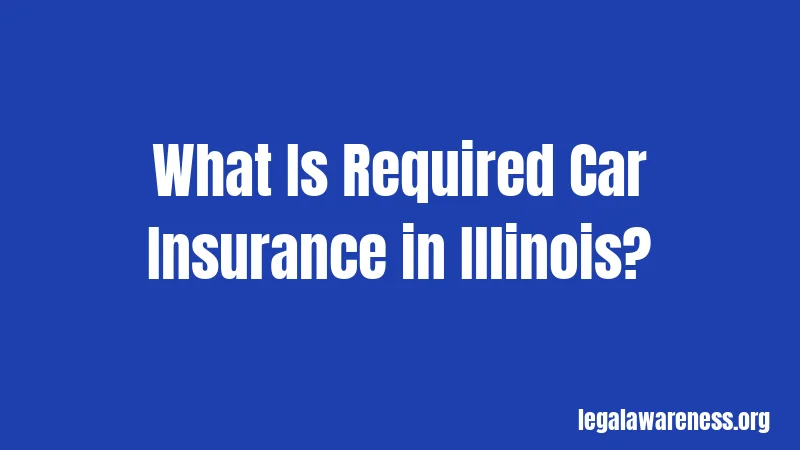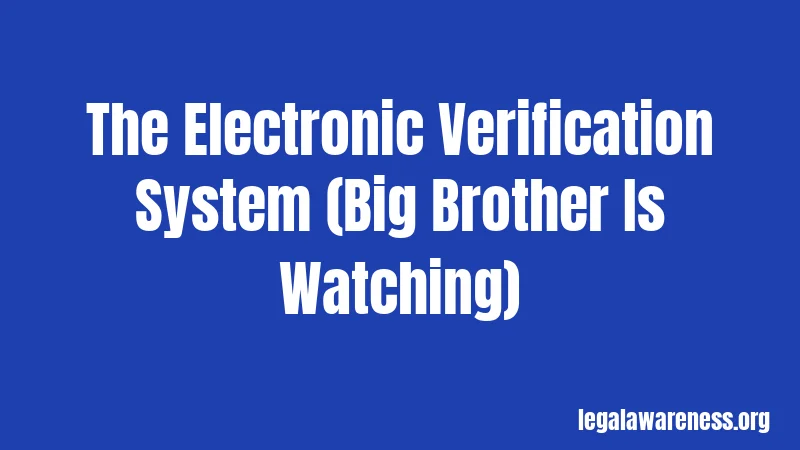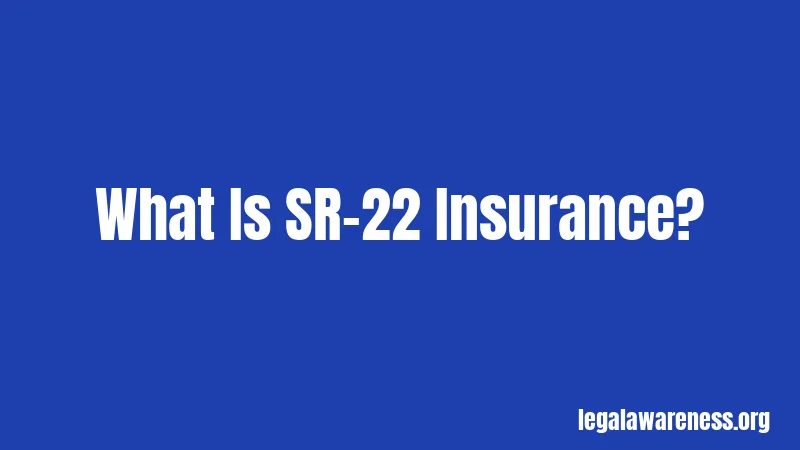Car Insurance Laws in Illinois (2026): Your Road-Ready Guide
Most people think car insurance is just a monthly bill. It’s actually way more than that. In Illinois, driving without insurance can wreck your finances and your freedom. Let’s break down exactly what you need to know.
Illinois takes car insurance seriously. The state watches your coverage automatically now. That’s right, they check on you twice a year without even pulling you over. Miss a payment? The state knows. Let your policy lapse? They’re already sending you a letter.
What Is Required Car Insurance in Illinois?

Every single vehicle registered in Illinois must have insurance. No exceptions.
The state requires three types of coverage. These are bodily injury liability, property damage liability, and uninsured motorist coverage. You need all three to drive legally.
Think of liability insurance like a safety net. It protects other people when you cause an accident. It does NOT cover your own car or injuries. Just theirs.
The Magic Numbers: 25/50/20
Wondering what those numbers mean?
Illinois requires what’s called 25/50/20 coverage. Here’s what that actually means in real dollars:
$25,000 per person for bodily injury. This covers one person’s medical bills if you hurt them in an accident.
$50,000 per accident for bodily injury. This is the total you’re covered for if multiple people get hurt.
$20,000 for property damage. This pays to fix or replace someone else’s car or property.
Sound complicated? It’s actually pretty straightforward.
If you hit someone and they need surgery, your insurance covers up to $25,000 for that person. If you total someone’s car, you’re covered up to $20,000 for the repairs.
Uninsured Motorist Coverage (You Need This Too)
Hold on, this part is important.
Illinois also requires uninsured motorist coverage. The minimums are the same as bodily injury: 25/50.
Why does this matter? Because not everyone follows the law. Some drivers have no insurance at all.
If an uninsured driver hits you, this coverage protects you. Without it, you’d be stuck paying your own medical bills. Even though they caused the accident.
Makes sense, right?
The Electronic Verification System (Big Brother Is Watching)

Okay… this one’s important.
Since July 2021, Illinois has used an electronic system called ILIVS. It stands for Illinois Insurance Verification System. Basically, it’s an automatic checker that makes sure you have insurance.
Here’s how it works. The system connects with every insurance company in the state. It checks your vehicle at least twice a year at random times. You never know when.
If you have active insurance, nothing happens. The system verifies it automatically. You won’t even get a notice.
But if the system can’t verify your coverage? You’re getting a letter.
What Happens If You Get “The Letter”
First, don’t panic. Getting a verification letter doesn’t automatically mean you’re in trouble.
The state sends you a notice asking for proof of insurance. You have 30 days to respond. Your insurance company can verify your coverage electronically through the ILIVS website.
If you actually don’t have insurance, you need to buy a policy immediately. Like, today. The longer you wait, the worse it gets.
After 30 days with no response, the system checks again. Still no insurance? Your registration gets suspended.
You’re not alone, this confuses a lot of people. The key is acting fast when you get that letter.
Penalties for Driving Without Insurance
Let’s talk about what happens if you skip insurance.
Trust me, this works out way more expensive than just paying for coverage.
First Offense
Get caught without insurance once? Here’s what you’re looking at:
Minimum $500 fine. That’s the base penalty.
Registration suspension. Your license plates get suspended until you get insurance.
$100 reinstatement fee. You pay this on top of everything else to get your plates back.
So simple! Just those three things will cost you at least $600. Plus you still need to buy insurance after all that.
Second and Subsequent Offenses
Not sure what counts as a violation? Let me break it down.
Second offense penalties are harsher. You still pay the $500 fine and $100 reinstatement fee. But now your registration is suspended for four months. Yep, four full months.
Third offense? Here’s where it gets really serious.
You face all the penalties above. Plus you must file an SR-22 certificate for three years. More on that in a minute.
Driving With Suspended Registration
Wait, it gets worse.
If you drive while your registration is suspended, the fine jumps to $1,000. Minimum.
You could also face a three-month driver’s license suspension. Notice that’s your license, not just your plates.
Pretty straightforward. Don’t drive without insurance. Don’t drive with suspended plates. The penalties stack up fast.
What Is SR-22 Insurance?

Sound complicated? It’s actually not.
An SR-22 isn’t really insurance. It’s a certificate that proves you have insurance. Think of it like a report card the state makes your insurance company file.
You need an SR-22 if you’ve committed serious violations. These include:
Three or more mandatory insurance violations. Getting caught without insurance three times triggers this requirement.
DUI or DWI convictions. Driving under the influence is a major red flag.
License suspension for any reason. If the state pulled your license, you might need an SR-22 to get it back.
Multiple traffic offenses in a short time. Racking up tickets can do it.
How Long Do You Need SR-22?
Here’s the timeline. Illinois requires you to maintain SR-22 for three continuous years.
Three full years. No breaks. No exceptions.
If your insurance lapses even once during those three years, your license gets suspended immediately. Then you start the whole process over.
Honestly, this is the part most people miss. You have to stay current on payments for the entire three years. One missed payment resets the clock.
How Much Does SR-22 Cost?
Not great news here.
Your insurance company charges a filing fee between $15 and $50. That’s just to file the paperwork.
But the real cost is your premiums. Because you’re considered high-risk, you’ll pay 50-80% more than regular insurance.
Some drivers pay double. Or more. It depends on your driving record.
Don’t have a car? You still need SR-22 if your license was suspended. You can get non-owner SR-22 insurance. It’s slightly cheaper than regular SR-22, but still pricey.
Should You Get More Than Minimum Coverage?
Okay, pause. Read this carefully.
The state minimums are just that. Minimums. They’re the legal bare minimum to drive.
But medical bills are expensive. Really expensive. Car repairs cost way more than they used to.
Why Minimum Coverage Might Not Be Enough
Let me paint a picture for you.
You cause an accident. The other driver needs surgery. It costs $40,000. Your insurance covers $25,000. Guess who pays the other $15,000? You do. Out of pocket.
You total a $35,000 car. Your insurance covers $20,000. You’re personally liable for the remaining $15,000.
Multiple people get hurt. Your $50,000 limit disappears fast when three or four people need medical care.
Most people don’t realize how strict these laws are. The limits haven’t changed in years, but costs have skyrocketed.
Better Coverage Options
Personally, I think higher limits make sense for most people.
Many agents recommend 100/300/100 coverage. That’s $100,000 per person, $300,000 per accident, and $100,000 for property damage.
Yes, it costs more per month. But it protects your assets if something serious happens.
If you own a home, have savings, or have anything you don’t want to lose in a lawsuit, consider higher limits.
What Coverage Is NOT Required (But You Might Want It)
The state only requires liability and uninsured motorist coverage. Everything else is optional.
But optional doesn’t mean unnecessary.
Collision Coverage
This covers damage to your own car from accidents. Regardless of who’s at fault.
Hit a tree? Collision coverage pays. Get rear-ended? It covers your repairs even while you wait for the other driver’s insurance.
Comprehensive Coverage
This one’s probably the most important rule.
Comprehensive covers non-accident damage. Think theft, vandalism, fire, hail, hitting a deer, floods, and more.
Your car gets stolen? That’s comprehensive. Tree falls on it? Comprehensive. Someone keys it in a parking lot? Yep, comprehensive.
Medical Payments Coverage
This pays your medical bills after an accident. It covers you and your passengers regardless of fault.
It’s especially useful if you don’t have good health insurance.
How to Prove You Have Insurance
Illinois accepts two forms of proof. You can show either one during a traffic stop or after an accident.
Insurance ID Card
Every insurance company gives you an ID card. It lists your policy information, coverage dates, and vehicle details.
Keep this in your car. Glove box works. Center console works. Just keep it somewhere you can grab it quickly.
Electronic Proof
Here’s where things get modern. Illinois allows digital proof on your phone.
Most insurance companies have apps now. Download yours. It has your insurance card right there.
Police officers accept this. Just pull it up and show them. Easy.
But make sure your phone is charged. Dead phone equals no proof equals potential problems.
Right?
What to Do If You Can’t Afford Insurance
Wondering if this applies to you?
Look, insurance is expensive. Especially if you’re young, have tickets, or need SR-22.
But driving without it costs way more. The fines alone exceed what most people pay annually for coverage.
Shop Around
Different companies charge wildly different rates for the same coverage. I looked this up recently. The price differences surprised me. They might surprise you too.
Get quotes from at least three companies. Maybe five. You can do it online in about 20 minutes total.
Ask About Discounts
Most insurers offer discounts you might qualify for. These include:
Good driver discounts. Clean record saves you money.
Multi-car discounts. Insure multiple vehicles together.
Paid-in-full discounts. Pay the whole six months upfront, save money.
Prior coverage discounts. Had insurance before? That helps.
Consider Higher Deductibles
Your deductible is what you pay before insurance kicks in. Higher deductible means lower monthly premium.
If you can afford to pay $1,000 out of pocket if something happens, raise your deductible to $1,000. Your monthly payment drops significantly.
What to Do After an Accident
Stay with me here.
Accidents are stressful. Having a plan helps. Here’s exactly what to do:
Call 911 if anyone is hurt. Don’t wait. Don’t guess if injuries are serious. Just call.
Don’t admit fault. Even if you think it was your fault, don’t say it. Say “I’m not sure what happened” or “I need to talk to my insurance company first.”
Take photos of everything. All vehicles. License plates. Damage. Road conditions. Skid marks. Everything.
Get the other driver’s information. Name, phone number, insurance company, policy number.
File a police report as soon as possible. Even for minor accidents. Some insurance companies require this.
Contact your insurance company right away. Most companies have 24/7 claim lines.
See a doctor even if you feel fine. Some injuries don’t show symptoms immediately.
Special Situations and Exceptions
Now, here’s where things get interesting.
What If You Don’t Own a Car?
You still might need insurance if you drive regularly. It’s called non-owner insurance.
This covers you when you borrow or rent vehicles. It also satisfies SR-22 requirements if you need that.
What If Your Car Is in Storage?
You can request a suspension of your registration if you’re not driving the car. Maybe it’s in storage for winter. Maybe it’s broken down.
Contact the Secretary of State. Let them know the vehicle is off the road. This prevents the electronic system from flagging you.
What If You Move Out of State?
Your Illinois insurance covers you if you drive in other states temporarily. But if you move permanently, you need insurance from your new state.
You have a grace period. But don’t push it. Get new insurance within 30 days of moving.
How Much Does Car Insurance Actually Cost in Illinois?
Let’s talk real numbers.
The average cost for minimum coverage in Illinois is about $552 per year. That’s roughly $46 per month.
Full coverage (including collision and comprehensive) averages about $1,806 per year. That’s about $150 per month.
But these are just averages. Your actual cost depends on tons of factors.
What Affects Your Rate?
Honestly, some of this isn’t fair. But it’s how the system works.
Your driving record matters most. Tickets and accidents raise your rates.
Your age affects pricing. Young drivers and very old drivers pay more.
Where you live makes a huge difference. Chicago costs way more than rural areas.
Your credit score impacts your rate. Better credit usually means lower premiums.
The car you drive matters. Sports cars cost more to insure than sedans.
This part can be tricky, honestly. Some people with perfect driving records pay more than people with DUIs, just because of their zip code or credit score.
There’s actually a campaign right now to change how insurance is priced in Illinois. But for now, these factors still apply.
Recent Changes and Updates
The electronic verification system went fully live in July 2021. It’s still relatively new, but it’s already caught thousands of uninsured drivers.
Before this system existed, Illinois only randomly checked about 3% of vehicles each year. Now? Everyone gets checked at least twice annually.
The system has reduced the uninsured driver rate significantly. From about 12.7% down to 6.9% in just the first year.
More enforcement is coming. The state continues to improve the system and catch more violators.
How to Stay Compliant
You’re not gonna love this one. But staying compliant is simple if you follow these rules:
Pay your insurance on time. Every time. Set up autopay if you’re worried about forgetting.
Keep your insurance active continuously. Even one day without coverage can trigger the system.
Update your information with your insurance company. New address? New phone? Tell them.
Keep proof of insurance in your vehicle. Always.
Respond immediately to any letters from the Secretary of State. Don’t ignore them.
That’s all you need. Literally.
Where to Get Help
Sound overwhelming? Don’t worry, we’ll break it down step by step.
If you need insurance or have questions:
Contact a local insurance agent. They can explain your options and find discounts.
Call the Illinois Secretary of State at 800-252-8980 for questions about ILIVS or registration.
Visit ILIVS.com to verify your insurance status or respond to notices.
Contact the Illinois Department of Insurance at 312-814-2420 with coverage questions.
Many people assume this is complicated. It’s more straightforward than you think.
Frequently Asked Questions
What happens if I get pulled over without my insurance card?
If you have insurance but just forgot your card, you can usually provide proof later and the ticket gets dismissed. But if you truly have no insurance, you’re looking at a $500 fine and registration suspension.
Can I drive someone else’s car with just my insurance?
Usually yes, but it depends. Their insurance is primary coverage. Your insurance might provide secondary coverage. Always check both policies to be sure.
Do I need insurance if I only drive occasionally?
Yes. If your car is registered in Illinois, it needs insurance whether you drive it daily or once a month. The electronic system doesn’t care how often you drive.
What if I can’t afford the reinstatement fee?
The $100 fee is mandatory. Some insurance companies might offer payment plans for insurance, but the reinstatement fee must be paid before your registration is restored.
How long does it take for ILIVS to verify my insurance?
Usually within a few days after your insurance company files it. You can check your status on ILIVS.com anytime using your VIN or reference number.
Final Thoughts
Now you know the basics. Illinois car insurance laws are strict, but they’re not impossible to follow.
Keep your insurance active. Respond to notices immediately. Don’t drive without coverage.
The penalties are expensive. Way more expensive than just buying insurance in the first place.
Stay informed, stay insured, and when in doubt, call your insurance agent. They’re there to help.
Drive safe out there.
References
- Illinois Compiled Statutes – Mandatory Insurance Law (625 ILCS 5/7-601)
- Illinois Secretary of State – Insurance Verification System
- Illinois Department of Insurance – Auto Insurance Information
- Illinois Secretary of State – SR-22 Insurance Requirements
- Illinois Vehicle Code – Financial Responsibility Provisions
